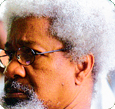Nobel Laureate, Professor Wole Soyinka yesterday strongly condemned the removal of Nuhu Ribadu as chairman of the Economic and Financial crimes Commission (EFCC), describing it as a contemptuous New Year gift, that constitutes an assault on the corporate integrity of the nation.
Comparing the removal of Ribadu to the assassination of Pakistani opposition leader, Mrs. Benazir Bhuto, Soyinka in a press statement said Ribadu’s removal would have a far more devastating impact on the psyche of the Nigerian nation “than the deadly event that now threatens to destabilize Pakistan,” through the assassination of her democratic front runner, Benazir Bhutto.
Also, Lagos lawyer and human rights activist, Chief Gani Fawehinmi said with the removal of Ribadu, the government has subverted the anti-corruption crusade embarked upon by the EFCC under the outstanding leadership of Ribadu.
Soyinka said the precarious socio-political condition into which the Pakistani people have been thrown, echoed, in both parallel and divergent directions, the blow dealt to the Nigerian nation by the “assassination” of the head of the EFCC.
The Nobel Laureate said Ribadu had commenced “the process of restoring dignity to a people whose nation has become a byword for the most breath-taking scam in high-places, for endemic corruption, contempt for accountability and transparency and the abuse of national resources in the pursuit of personal and party power consolidation.”
With the removal of Ribadu, he said the ruling Peoples Democratic Party (PDP) had proven yet again that there is no reformist agenda possible within its ranks.
“The presidential incumbent bears the primary and ultimate responsibility for this grotesque reversal of the nation's frustrated push towards possible redemption. But it is the ruling party itself, the PDP, that continues to suffocate the nation in its folds of corruption, negating every attempt to rid her of this incubus, since that party has exhibited itself, again and again, as the very quagmire of corruption, nurtured on corruption, sustained by corruption and dependent on corruption for its very survival.”
Soyinka said the removal of Ribadu was not about the removal of one individual: “We are talking about signals, portents for future conduct, about the erosion of credibility, abandonment of principles, all of which of course transcends any individual. The timing, when viewed with the recent call to re-open the case-files of unsolved political murders, will be regarded as a coincidence only by starry-eyed innocents from space – good luck to them.
“Those of us who have the slightest knowledge of behind-the-scenes manipulations since the trail of detection moved ever closer to the very apex of governance under the past regime, know that the nation was being brought closer and closer to the dismantling of one of the most sinister and corrupt governance machines that this nation has ever confronted – including even the incontinent reign of Sani Abacha.
“Ribadu's removal is therefore not an individual predicament. The situation here does not permit of the familiar cliche of any one individual being less than an institution or agency – no, that is not the issue! The issue is that an effective agency has been tampered with, unnecessarily, but with transparent motivations that constitute an assault on the corporate integrity of the nation. The trust of the nation has been abused – that is the issue.
“Instead of reinforcing the autonomy of an organisation that is clearly dedicated to probity and political integrity, notice has been sent to all four corners of the nation, and to the international community that, at the slightest threat to the hegemony of corrupt rule, the credibility of even the most laudable institutions will be eroded.”
He stressed that the liberalization of political space was contingent upon the moral cleansing of such a space, a process he said Ribadu had started.
The Nobel Laureate continued: “The battle against corruption therefore goes beyond the walling out of illegal economic advantages. Corruption is the very bedrock of political illegitimacy. The tree of democracy cannot thrive on the compost of corruption. This obvious attempt at crippling one of the two anti-corruption crusade agencies of the nation, unarguably aggressive and result oriented on an unprecedented scale, must therefore be read as an assault on the very bastion of democracy.
“Again, I refer to my earlier indications that the riddle of most of the political murders in the nation will be solved when the anti-corruption project has attained its ultimate goal of unearthing the hidden. Let me refer yet again to the notorious case where a presiding judge on a politically motivated murder case threatened early to withdraw from the case. Soon after, he withdrew from the case altogether – the pressure, he openly announced, coming from the most unexpected quarters, had made his task impossible.
“That judge noted down details of monetary inducements that were offered to make him grant bail to a high-profile suspect. The upward spiral of that political suspect since his 'acquittal' says much about the umbilical cord that trails from material to political corruption.”
The Nobel Laureate wondered if Ribadu has become yet another sacrificial lamb on the altar of success and promise of more and more success.
He said if this was the case, then, the nation has indeed been brought to an abysmal low. “Confusion has been deliberately and liberally sown. The reign of vanishing files, denied directives and ambiguous legal advises has begun where dubious attorney-generals fill the vacuum created by high level movements of personnel in multiple directions where those in the most sensitive and knowledgeable places vanish into the bureaucratic maze, with hardly a trace of the rewards of their long dedicated industry. Technical extensions of cut-and-dried prosecutions will now lengthen into eternity and of course – oblivion,” he forewarned.
Soyinka described the removal of the EFCC boss as a dismal, contemptuous New Year gift to the nation. “Again, I lament with the democratic people of Pakistan but, even in the midst of your grief, spare a moment of pity for that land of eternal missed opportunities and blighted hopes, that clay-footed giant sibling on a continent to your West, known as Nigeria.”
In his reaction, Gani Fewehinmi, who spoke to THISDAY on the phone from London, said the EFCC boss has over the years shown an unusual courage, determination, dedication and commitment to the fight against corruption in the country.
He said: “All that Ribadu has been doing is in conformity with section 15, sub-section 5 of the constitution, which provides that the state shall abolish all corrupt practices and abuse of power. Ribadu has become a hero of the Nigerian masses in the pursuit of his constitutional duties.
“The PDP government of Umaru Yar’Adua has acted against constitutional provision and the heroic effort of Ribadu. Why is he being removed at a time the looters of our treasury are being apprehended? The looters are being charged to court, one by one and suddenly, Ribadu is being removed. Certainly, the latest criminal proceeding against James Ibori who played a major financial role in bringing Yar’Adua to power must have disturbed the president.”
The human rights activist said the statement by President Yar’Adua on May 29 that he would have a zero-tolerance for corruption had now been debunked by Ribadu’s removal.
He said the international community would no longer take the Yar’Adua government seriously on the issue of anti-corruption.
“As for Ribadu, he will remain in the hearts and minds of Nigerians as a man who came and fought against corruption in a way that has never been done before since the amalgamation of Nigeria in 1914,” Gani said.
Ribadu was directed to proceed on a one-year study leave at the National Institute for Policy and Strategic Studies at Kuru, near Jos, Plateau State, effectively ending his four-year tenure as head of the corruption and economic crimes fighting agency, EFCC.
In an address, Thursday, the Inspector General of Polic, Mike Okiro, stated his redeployment was a routine exercise for senior police officers. The IGP defended Ribadu’s removal saying sending eligible officers on course is part of the routine in every service, the police inclusive.
But Ribadu’s removal in several quarters did not come as a shock and has been in the cards since the inception of this administration, with alleged surreptitious moves to either water down the powers of the EFCC or remove him as its chairman. Efforts were stepped up a gear more recently because of the high profile corruption cases he was pursuing against some politicians and past governors.
The Attorney General and Minister of Justice, Michael Aondoakaa, had shortly on resumption of office sent a memo to the president, requesting to take over the prosecutorial powers of the agency, a move that was greeted with public outrage. He also recently said he was going to merge the anti-graft agencies based on a complaint by Ebonyi State that their functions overlap.
By Yemi Adebowale
This Day
Saturday, December 29, 2007




